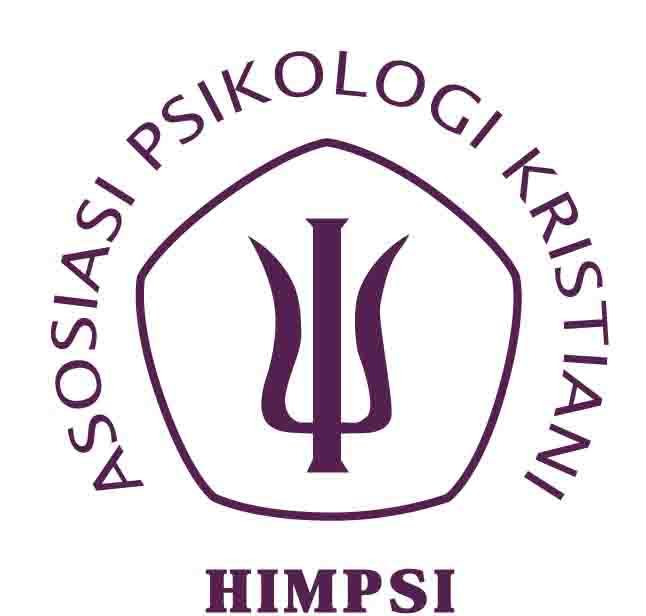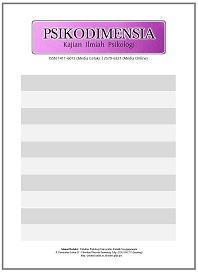The Role of Technostress on Educators' Work Performance at Universities in the Special Capital Region of Jakarta
Abstract
The COVID-19 pandemic forced the education system to adapt a new teaching system from offline to online. However, the ability of lecturers is often unable to keep up with rapid technological developments and the lack of resources provided by institutions, causes lecturers to feel stressed during the teaching and learning process. This study aims to determine the effect of technostress on lecturer performance using the Person-Organization Fit theory approach. The results showed that at the organizational level, the discrepancy between abilities and demands (AD-O) (B= -.39; p<.01) had a significant negative and positive effect on lecturer needs with supplies (NS-O) (B=. 24;p<.05) with performance. At the individual level, the mismatch between needs and supply (NS-T) (B=-.51; p<.01), the absence of social support from colleagues (PPF) (B=-.32; p<.01) had an effect significant negative. The findings of this study indicate that both the organizational level and peer support (AD-O and PPF) as well as the individual level (NS-T) play an important role in predicting a decrease in lecturer performance, while the mismatch between ability demands at the individual level has no effect on performance. The implications of this research will be discussed further in the discussion.
Keywords
Full Text:
PDFReferences
Al-Fudail, M., & Mellar, H. (2008). Investigating teacher stress when using technology. Computers & Education, 51(3), 1103–1110. https://doi.org/10.1016/j.compedu.2007.11.004
Altinay-Gazi, Z., & Altinay-Aksal, F. (2017). Technology as a mediation tool for improving the teaching profession in higher education practices. Eurasia Journal of Mathematics, Science and Technology Education, 13(3), 803–813. https://doi.org/10.12973/eurasia.2017.00 644a
Antonietti, C., Cattaneo, A., & Amenduni, F. (2022). Can teachers’ digital competence influence technology acceptance in vocational education? Computers in Human Behavior, 132, 107266. https://doi.org/https://doi.org/10.1016/ j.chb.2022.107266
Avanzi, L., Fraccaroli, F., Castelli, L., Marcionetti, J., Crescentini, A., Balducci, C., & van Dick, R. (2018). How to mobilize social support against workload and burnout: The role of organizational identification. Teaching and Teacher Education, 69, 154–167. https://doi.org/10.1016/j.tate.2017.10.001
Azwar, S. (2010). Metode Penelitian. Yogyakarta: Pustaka Pelajar.
Bereczki, E. O., & Kárpáti, A. (2021). Technology-enhanced creativity: A multiple case study of digital technology-integration expert teachers’ beliefs and practices. Thinking Skills and Creativity, 39. https://doi.org/10.1016/ j.tsc.2021.100791
Bichler, S., Gerard, L., Bradford, A., & Linn, M. C. (2021). Designing a remote professional development course to support teacher customization in science. Computers in Human Behavior, 123. https://doi.org/10.1016/ j.chb.2021.106814
Carroll, D., Lovallo, W. R., & Phillips, A. C. (2009). Are large physiological reactions to acute psychological stress always bad for health? Social and Personality Psychology Compass, 3(5), 725–743. https://doi.org/10.1111/j.1751-9004.2009.00205.x
Çetin, D., & Bülbül, T. (2017). Okul Yöneticilerinin Teknostres Algıları İle Bireysel Yenilikçilik Özellikleri Arasındaki İlişkinin İncelenmesi. In Abant İzzet Baysal Üniversitesi Eğitim Fakültesi Dergisi, 17(3).
Chen, C.-H. (2008). Chen, C.: Why Do Teachers Not Practice What They Believe Regarding Technology Integration? The Journal of Educational Research 102(1), 65-75. https://doi.org/10.3200/JOER.102.1.65-75
Dahabiyeh, L., Najjar, M. S., & Wang, G. (2022). Online teaching during COVID-19 crisis: the role of technostress and emotional dissonance on online teaching exhaustion and teaching staff productivity. The International Journal of Information and Learning Technology, 39(2), 97–121. https://doi.org/10.1108/IJILT-09-2021-0147
Daniel, S. J. (2020). Education and the COVID-19 pandemic. Prospects, 49(1–2), 91–96. https://doi.org/10.1007/s11125-020-09464-3
Daumiller, M., Rinas, R., Hein, J., Janke, S., Dickhäuser, O., & Dresel, M. (2021). Shifting from face-to-face to online teaching during COVID-19: The role of university faculty achievement goals for attitudes towards this sudden change, and their relevance for burnout/engagement and student evaluations of teaching quality. Computers in Human Behavior, 118. https://doi.org/10.1016/j.chb. 2020.106677
Etikan, I. (2016). Comparison of Convenience Sampling and Purposive Sampling. American Journal of Theoretical and Applied Statistics, 5(1), 1. https://doi.org/10.11648/j.ajtas. 20160501.11
Ferri, F., Grifoni, P., & Guzzo, T. (2020). Online learning and emergency remote teaching: Opportunities and challenges in emergency situations. Societies, 10(4). https://doi.org/10. 3390/soc10040086
Field, A. P. (2018). Discovering statistics using IBM SPSS statistics. Sage Publications.
Fuglseth, A. M., & Sørebø, Ø. (2014). The effects of technostress within the context of employee use of ICT. Computers in Human Behavior, 40, 161–170. https://doi.org/10.1016/j.chb.2014. 07.040
Giorgi, G., Lecca, L. I., Alessio, F., Finstad, G. L., Bondanini, G., Lulli, L. G., Arcangeli, G., & Mucci, N. (2020). COVID-19-related mental health effects in the workplace: A narrative review. International Journal of Environmental Research and Public Health, 17(21), 1–22. https://doi.org/10.3390/ijerph17217857
Graham, C., Burgoyne, N., Cantrell, P., Smith, L., Clair, L., & Harris, R. (2009). Measuring the TPACK Confidence of In-service Science Teachers. TechTrends, 53(5).
Gros Salvat, B., & Silva Quiroz, J. (2005). La Formación Del Profesorado Como Docent E En Los Espacios Virtuales De Aprendizaje. Revista Iberoamericana De Educación, 36(1), 1-14. https://doi.org/10.35362/rie3612831
Hofer, S. I., Nistor, N., & Scheibenzuber, C. (2021). Online teaching and learning in higher education: Lessons learned in crisis situations. Computers in Human Behavior, 121. https://doi.org/10.1016/j.chb.2021.106789
Hogan, R. L., & McKnight, M. A. (2007). Exploring burnout among university online instructors: An initial investigation. The Internet and Higher Education, 10(2), 117–124. https://doi.org/https://doi.org/10.1016/j.iheduc.2007.03.001
Hsiao, K.-L. (2017). Compulsive mobile application usage and technostress: the role of personality traits. Online Information Review, 41(2), 272–295. https://doi.org/10.1108/OIR-03-2016-0091
Hwang, Y. S., Bartlett, B., Greben, M., & Hand, K. (2017). A systematic review of mindfulness interventions for in-service teachers: A tool to enhance teacher wellbeing and performance. Teaching and Teacher Education, 64, 26–42. https://doi.org/10.1016/J.TATE.2017.01.015
Irawati, D. Y., & Jonatan, J. (2020). Evaluasi Kualitas Pembelajaran Online Selama Pandemi Covid-19: Studi Kasus di Fakultas Teknik, Universitas Katolik Darma Cendika. Jurnal Rekayasa Sistem Industri, 9(2), 135–144. https://doi.org/10.26593/jrsi.v9i2.4014.135-144
Jena, R. K. (2015). Technostress in ICT enabled collaborative learning environment: An empirical study among Indian academician. Computers in Human Behavior, 51, 1116–1123. https://doi.org/https://doi.org/10.1016/j.chb.2015.03.020
Jung, I., Kudo, M., & Choi, S.-K. (2012). Stress in Japanese learners engaged in online collaborative learning in English. British Journal of Educational Technology, 43(6), 1016–1029. https://doi.org/10.1111/j.1467-8535.2011.01271.x
Kinyita, P. (2015). Relationship Between Work Stress And Perfomance Of Employees: A Case Study Of Transit Hotel In Nairobi City County. Archives of Business Research, 3(6). https://doi.org/10.14738/abr.36.1538
Ko, E.-J., Kim, A.-H., & Kim, S.-S. (2021). Toward the understanding of the appropriation of ICT-based Smart-work and its impact on performance in organizations. Technological Forecasting and Social Change, 171, 120994. https://doi.org/https://doi.org/10.1016/j.techfore.2021.120994
Koh, J. H. L., Chai, C. S., & Lim, W. Y. (2016). Teacher Professional Development for TPACK-21CL: Effects on Teacher ICT Integration and Student Outcomes. Journal of Educational Computing Research, 55(2), 172–196. https://doi.org/10.1177/0735633116656848
la Torre, G., de Leonardis, V., & Chiappetta, M. (2020). Technostress: how does it affect the productivity and life of an individual? Results of an observational study. Public Health, 189, 60–65. https://doi.org/10.1016/j.puhe.2020.09.013
Lee, S. B., Lee, S. C., & Suh, Y. H. (2016). Technostress from mobile communication and its impact on quality of life and productivity. Total Quality Management and Business Excellence, 27(7–8), 775–790. https://doi.org/10.1080/14783363.2016.1187998
Lemay, D. J., Bazelais, P., & Doleck, T. (2021). Transition to online learning during the COVID-19 pandemic. Computers in Human Behavior Reports, 4. https://doi.org/10.1016/j.chbr. 2021.100130
Luchman, J. N., & González-Morales, M. G. (2013). Demands, control, and support: A meta-analytic review of work characteristics interrelationships. Journal of Occupational Health Psychology, 18(1), 37–52. https://doi.org/10.1037/a0030541
Munyengabe, S., Yiyi, Z., Haiyan, H., & Hitimana, S. (2017). Primary teachers’ perceptions on ICT integration for enhancing teaching and learning through the implementation of one Laptop Per Child program in primary schools of Rwanda. Eurasia Journal of Mathematics, Science and Technology Education, 13(11), 7193–7204. https://doi.org/10.12973/ejmste/79044
Özgür, H. (2020). Relationships between teachers’ technostress, technological pedagogical content knowledge (TPACK), school support and demographic variables: A structural equation modeling. Computers in Human Behavior, 112. https://doi.org/10.1016/j.chb.2020.106468
Penado Abilleira, M., Rodicio-García, M. L., Ríos-de Deus, M. P., & Mosquera-González, M. J. (2021). Technostress in Spanish University Teachers During the COVID-19 Pandemic. Frontiers in Psychology, 12. https://doi.org/10. 3389/fpsyg.2021.617650
Penado Abilleira, M., Rodicio-García, M. L., Ríos-de-Deus, M. P., & Mosquera-González, M. J. (2020). Technostress in Spanish University Students: Validation of a Measurement Scale. Frontiers in Psychology, 11. https://doi.org/ 10.3389/fpsyg.2020.582317
Pullins, E., Tarafdar, M., & Pham, P. (2020). The dark side of sales technologies: how technostress affects sales professionals. Journal of Organizational Effectiveness, 7(3), 297–320. https://doi.org/10.1108/JOEPP-04-2020-0045
Ragu-Nathan, T. S., Tarafdar, M., Ragu-Nathan, B. S., & Tu, Q. (2008). The consequences of technostress for end users in organizations: Conceptual development and validation. Information Systems Research, 19(4), 417–433. https://doi.org/10.1287/isre.1070.0165
Rahayu, R. P., & Wirza, Y. (2020). Teachers’ Perception of Online Learning during Pandemic Covid-19. Jurnal Penelitian Pendidikan, 20, 392–406.
Salanova, M., Llorens, S., & Cifre, E. (2013). The dark side of technologies: Technostress among users of information and communication technologies. International Journal of Psychology, 48(3), 422–436. https://doi.org/10.1080/00207594.2012.680460
Scherer, R., Howard, S. K., Tondeur, J., & Siddiq, F. (2021). Profiling teachers’ readiness for online teaching and learning in higher education: Who’s ready? Computers in Human Behavior, 118. https://doi.org/10.1016/j.chb.2020.106675
Schildkamp, K., van der Kleij, F. M., Heitink, M. C., Kippers, W. B., & Veldkamp, B. P. (2020). Formative assessment: A systematic review of critical teacher prerequisites for classroom practice. International Journal of Educational Research, 103. https://doi.org/10.1016/j.ijer. 2020.101602
Skaalvik, E. M., & Skaalvik, S. (2015). Job satisfaction, stress and coping strategies in the teaching profession-what do teachers say? International Education Studies, 8(3), 181–192. https://doi.org/10.5539/ies.v8n3p181.
Shadiev, R., & Yang, M. (2020). Review of studies on technology-enhanced language learning and teaching. Sustainability, 12(2), 524.
Stošić, L., & Stošić, I. (2015). Perceptions of teachers regarding the implementation of the internet in education. Computers in Human Behavior, 53, 462–468. https://doi.org/10.1016/ j.chb.2015.07.027
Tang, Y. M., Chen, P. C., Law, K. M. Y., Wu, C. H., Lau, Y.-Y., Guan, J., He, D., & Ho, G. T. S. (2021). Comparative analysis of Student’s live online learning readiness during the coronavirus (COVID-19) pandemic in the higher education sector. Computers & Education, 168, 104211. https://doi.org/10.1016/j.compedu.2021.104211
Tarafdar, M., Maier, C., Laumer, S., & Weitzel, T. (2020). Explaining the link between technostress and technology addiction for social networking sites: A study of distraction as a coping behavior. Information Systems Journal, 30(1), 96–124. https://doi.org/10.1111/isj.12253
Tarafdar, M., Tu, Q., Ragu-Nathan, B. S., & Ragu-Nathan, T. S. (2007). The impact of technostress on role stress and productivity. Journal of Management Information Systems, 24(1), 301–328. https://doi.org/10.2753/MIS0742-1222240109
Tiwari, V. (2021). Countering effects of technostress on productivity: moderating role of proactive personality. Benchmarking, 28(2), 636–651. https://doi.org/10.1108/BIJ-06-2020-0313.
Voet, M., & de Wever, B. (2017). Towards a differentiated and domain-specific view of educational technology: An exploratory study of history teachers’ technology use. British Journal of Educational Technology, 48(6), 1402–1413. https://doi.org/https://doi.org/10.1111/bjet.12493
Wang, X., & Li, B. (2019). Technostress among teachers in higher education: An investigation from multidimensional person-environment misfit. Frontiers in Psychology, 10(JULY). https://doi.org/10.3389/fpsyg.2019.01791
Yunita, P. I., & Saputra, I. G. N. W. H. (2019). Millennial generation in accepting mutations: Impact on work stress and employee performance. International Journal of Social Sciences and Humanities, 3(1), 102–114. https://doi.org/10.29332/ijssh.v3n1.268.
Zheng, F., Khan, N. A., & Hussain, S. (2020). The COVID 19 pandemic and digital higher education: Exploring the impact of proactive personality on social capital through internet self-efficacy and online interaction quality. Children and Youth Services Review, 119, 105694. https://doi.org/10.1016/j.childyouth. 2020.105694
DOI: https://doi.org/10.24167/psidim.v22i1.4935
Print ISSN : 1411-6073 | online ISSN : 2579-6321 View My Stats

This work is licensed under a Creative Commons Attribution 4.0 International License.




















